My stance in general on flavored whisky is that if sugar is involved, I stay away from it. I also generally don’t review them, since their purpose is usually to “enhance” cocktails with specific flavors or to provide sugar to ease the burn of whisky when taken as a shot. Really, this stance is hard to defend, since in essence all whisky is “flavored” by oak – or by compounds that are extracted by the high-proof alcohol over time, including wood sugars. Going one step further, many of my favorite whiskies are “flavored” by the sherry or other (sweet) contents left behind in newly-dumped barrels that are then used to age whisky. It shouldn’t be surprising that scotch is allowed by law to have a certain small amount of sherry or other wine mixed into it (specifically whatever is still sloshing around the bottom of a recently-dumped wine cask). This sherry can even be ADDED to a dry cask to “season” it before the whisky goes in. It’s tough to stand on some kind of moral high ground and claim that sherry added to whisky is OK, but cinnamon syrup is not.
Still, I stand by my prejudices, even if I can’t defend them.
Here’s an interesting exception. Rather than adding hop-flavored sugar syrup mixed up in some lab, which is what Hiram Walker and its ilk would do, Sons of Liberty set out to create a whiskey that evoked refreshing summertime IPA beer by actually distilling an IPA beer wash, suspending hops in a gin basket during pot-still distillation, and then dry-hopping the finished (aged) whiskey! No sugar syrup, no weird chemicals, just artisanal ingredients treated with respect and the creative use of traditional brewing and distilling methods to craft something innovative. I can bend my indefensible position on flavored whiskies for that.
Sons of Liberty’s Hop Flavored Whiskey is a seasonal release (they also have a Pumpkin one). Distilled from an IPA (India Pale Ale) wash, and then distilled with a gin basket hung in the pot still containing Cascade and Centennial hops. The resulting “whiskey” (or malt gin?) is aged for less than 2 years in American oak and then dry-hopped with Citra and Sorachi Ace hops before bottling at 40% ABV.
Batch #3, Bottle #447
Nose: Piercing notes of grapefuit juice, pine sap, and orange peel. Very perfumed, with fruits and florals in dizzying number. Not particularly bitter (yet), but very strongly reminiscent of the scent of a freshly-poured draft IPA. The whisky notes are overshadowed by the hops, but there is a biscuity, fruitcake-like depth to the aroma.
Palate: Sweet. Medium-bodied, with hops notes that are at first strongly bitter, and then calm down and become familiar – pine resin, lemon peel. There is a slight undercurrent of pale malt and vanilla, but as an afterthought.
Finish: On the short side. Surprisingly not bitter. Some of the fruit notes linger, becoming jammy. Fades with pine, lemon.
With Water: Oddly, a few drops of water seem to mute the hop notes, leaving not a whole lot behind. I would definitely not add any water to this. Out of curiosity, I tried a dram of this on ice and found the same thing – the hop notes are very muted and without them, there isn’t much else going on. I would either drink this neat or use it to create a subtly hop-infused whiskey cocktail.
Overall: There is no question that the hop character is fully and prominently displayed, with all of the full range of hop-derived flavors and aromas but amplified and carried by the alcohol, to the point that the whiskey itself is little more than a vehicle for the distilled, concentrated essence of IPA. Surely this was the point, and it’s one of the more successful flavored whiskies I’ve tasted. I’m very glad that the “flavoring” of this whisky is restricted to the use of hops, rather than the type of sugar-laden syrup that other flavored whiskies suffer from. I suggest that if you come across a bottle of this and you’re a fan of hoppy beer that you buy it just for the novelty of it. You won’t be disappointed by the quality, even if you’re not really sure what to do with a hop-flavored “whiskey”!



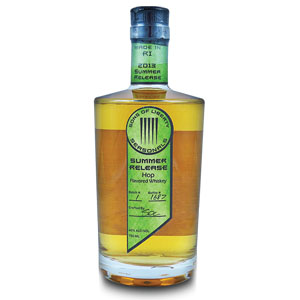
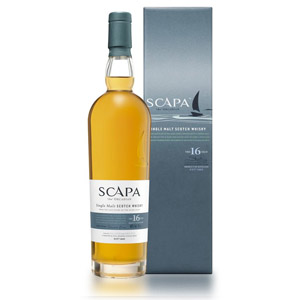

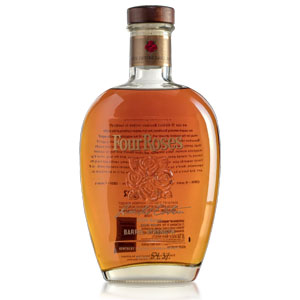
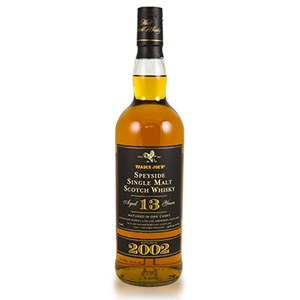
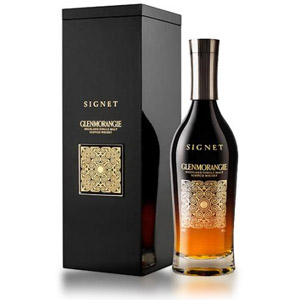
This whiskey sounds like a lot of fun! In general, it seems like these guys are doing a lot of fun, creative stuff, and I applaud them for doing it the “right” way, rather than (as you said) making sugary, whiskey-ish liqueurs.
Sadly, it doesn’t look like they distribute much outside of Rhode Island, but when I’m back in New England I’ll be keeping my eye out!
Per the TTB regulations regarding whiskey (as nicely organized here by Sku: http://recenteats.blogspot.com/2015/08/whiskey-law-age-statement.html?m=1), “aged less than 2 years” is unacceptable. While I don’t really care how long it’s been ages, so long as it’s a well crafted product (and I’m interested to sample “Battle Cry”), their age statement is illegal and misleading. I wonder how long it was actually aged. I mean, even Tate’s creations at Balcones were delicious and they weren’t aged for very long. I just don’t like when producers do this kind of thing.
Hi Stilldaddy. I can’t comment on the legal aspect (because I just don’t know), but I’m guessing that the addition of hops invalidates it for the “whiskey” label anyway. As far as the age goes (and this is a guess), I got my age information from the marketing material, not from the bottle label, which (at least on my bottle) does not list an age. Thus, if they’re breaking any law, it’s this one: “An age statement is required to be listed on the label if the whiskey is younger than four years old.” …which sounds to me like 75% of the whiskies on the shelf under $30.
This one may be an exception given that it’s “Hop flavored whiskey” (so perhaps it’s in the flavored whiskey category which does not require an age statement), but the other two are “single malt whiskey” which does require a specific, not to be understated age. Meaning “over two years” is fine but “under two years” is not.
Most whiskeys under $30 these days are produced by the major distilleries who love to point out that their whiskey is over four years old by labeling it “straight”. Hypothetical statistics aside, it’s still illegal to label whiskey as younger than x years.
And if my single anonymous voice could be heard for a small request, would you please use the label info in your reviews instead of, or at least alongside, reviews? Marketing material is highly suspect in the distillery business these days, but at least the label has to meet government approval (even if they do let improper things through on occasion).